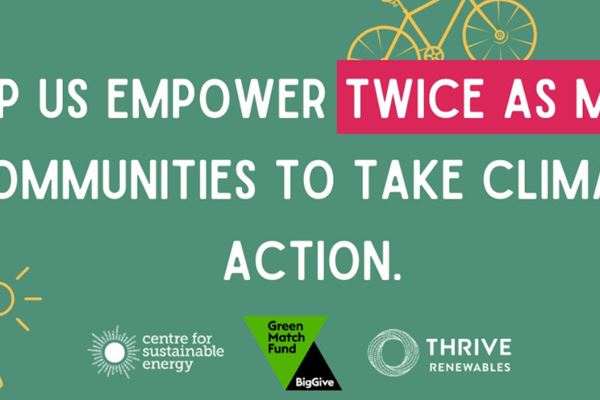"Fossil fuels are a finite resource, and for the same price, renewables can generate the same energy without the subsequent cost to the environment and by extension to society." Matthew Clayton, Executive Director, Triodos Renewables
As the world tries to come to terms with the increasingly disruptive and damaging effects of climate change, the challenge is there for governments, businesses and individuals alike to get on board to switch over from fossil fuels and consume energy more consciously. As a planet, we need to realise the huge benefits of clean energy to reverse our dependence on fossil fuels and the associated concentrations of greenhouse gases in the atmosphere.
Resources such as wind, sunlight, rainfall, tides and waves are all there for the taking – and they’re infinite. If we use them to the greatest extent possible, it gives scope to preserve the finite fossil fuel resources for their most valuable applications, materials and medicines. And the effects aren’t just environmental: the UK’s onshore wind industry contributed £906m to the UK economy last year, of which almost 30% directly benefits local areas.
The recent fall in oil prices has created media speculation about what this means for renewables, especially the wind and hydro generation that we do here at Triodos Renewables. But, as I highlighted in a recent BBC Costing The Earth broadcast, the oil price drop, among other things has been a cause of clean energy levelling up to fossil fuels. And while oil may be more affordable than it has been in a long time, it does not signify the end of renewables: after all, the stone-age didn’t end because we ran out of stones, and we don’t need to wait for oil to be depleted to move into a new age of energy.
THE POWER OF SUBSIDIES
2014 was another record-breaking year, where renewable energy's contribution to the UK grid grew to 19.2% : almost a fifth of our electricity and a greater contribution than nuclear. Reducing the subsidy gap is one of the cheapest ways to increase fuel efficiency and speed up the switch to cleaner energy, but as debates on the affordability of green policies roll on, governments neglect to provide real transparency or choice.
How often have you heard that fossil-fuel subsidies outpace renewable-energy subsidies by a factor of six to one when considering support for some of the most competitively priced sustainable power sources like onshore wind and hydro? The International Energy Agency estimates that subsidies for fossil fuels exceed $545 billion – greater than the GDP of Denmark. When environmental costs and tax exclusions are factored in, the International Monetary Fund estimates global fuel subsidies now amount to $5.3 trillion annually – 6% of global GDP, and more than is spent on healthcare.
Subsides aren’t the only way fossil fuels are getting ahead, either. When long term power prices fell by around 8% last year, we saw the introduction of the capacity market, which directly supports fossil fuelled generators. These powerful advantages for fossil fuels create barriers to effective clean energy implementation. However, the industry’s success in spite of this is testament to its efficacy.
THE REALITY OF LOW OIL PRICES
The recent plummet in oil prices may initially seem like bad news for clean energy. However, while the value of oil prices may be reduced, there has not been a simple passing on of these savings to our energy bills, or even the price of fuel at the pumps.
This apparent disconnection is, to some extent, down to the tangled web of contracts and derivatives which provide some protection when prices are rising, but also create a lag when prices are falling, not to mention a concoction of taxes, tax breaks, levies and incentives for which the fossil fuel industry is eligible. Additionally, the operations and maintenance, transmission, distribution and capital costs make up more than half the cost of fossil fuelled generation, which means in the short to medium term there is very little benefit to the end user.
LOW OIL PRICES: GOOD FOR RENEWABLES
In fact, many countries are taking advantage of cheap oil by trimming fossil-fuel subsidies. This is a huge benefit for renewables because in the absence of subsidies, the proven renewable energy technologies are close to competitive with fossil fuelled plants.
A reduction in fossil fuel prices may provide governments with the confidence to better implement the greenhouse gas emissions trading regime providing an incentive to reduce emissions rather than a windfall opportunity for major polluters.
RENEWABLE ENERGY HAS ALL TO PLAY FOR
While lower oil prices might sound like bad news for renewables, as subsidies reduce, we will see energy at its face value price, levelling out oil prices. Fossil fuels are a finite resource, and for the same price, renewables can generate the same energy without the subsequent cost to the environment and by extension to society. By reducing fossil fuel subsidies, governments can provide solar, hydro and wind power a level playing field on cost at a time when their popularity is growing in response to global warming.
In the last 12 months there has been a growing contribution of sustainable energy, via renewable generation, energy efficiency and the early steps towards storage, all of which we will feel the long term benefit of for far longer than a blip in oil prices. In the same way as the stone-age ended as humans identified smarter ways to sustain life, Triodos Renewables are part of a global movement to identify better ways to meet our energy needs.



